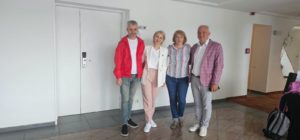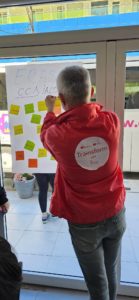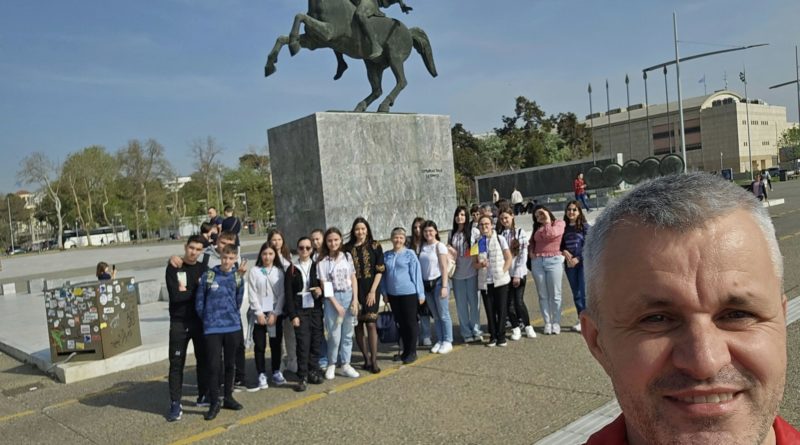Cătălin Crăciun: “…in life we must follow our calling.”
You fall in love with Cătălin Crăciun from Slobozia, Ialomita from the first sight: his face is all smiles, and his speech is calm. Bright and cheerful eyes playfully survey you, and its capacity for work is enormous. Cătălin likes people, that’s why he chose his job as a teacher. With his four university degrees, Cătălin could have a career that would bring him money, a lot of money. But this is not what his life is about, but about sharing knowledge, help and experiences. I am glad to meet and collaborate in the Erasmus+ Romania Embassy! We share many values and try, each according to his strengths, to convey to those around us that without education the world cannot evolve.
M.N.: – You graduated from several faculties: Orthodox pastoral theology, engineering and management of technological systems, physical education and sports, and biology and environmental protection Why four and so diverse?
C.C.: – In 1995, I registered for admission to the Orthodox High School Theological Seminary “Saint John the Golden Mouth” in Slobozia, a seminary I graduated in 2000. Here, for five years, I had a very good education, education that shaped me not only academically but also for life. After graduating from this vocational high school, it was natural for me to enroll in a professional college, for which I applied for admission to the Valahia University in Târgoviște immediately after the baccalaureate exam. It then held an entrance exam in July, all other university centers scheduled admission later.
After finishing the Faculty of Theology, I took the tenure exam, which I passed for the first time and I got tenure from the first year, choosing the position of teacher at the school where I taught for eight years (primary and secondary school). In the year 2000, when I entered the educational system, in a secondary school there was very little talk about digitization in the approach to lessons in primary and secondary classes, which is why innovation and the creation of didactic approaches were and are a permanent concern for me. I strongly believe that today, just imagining captures the attention of students who belong to the “Z” generation. You have to always come up with something new, attractive and interesting, something unknown to them like digital applications, because they get bored quickly, being digital natives.
I started the third faculty, the sports one, from a challenge that arose within an Erasmus+ project, around 2016. In that year, I started with timid and small steps to discover the world of Erasmus+, which I regret now, strongly, that I didn’t discover it much sooner.
The fourth faculty “Biology and environmental protection” was chosen out of passion, the faculty I graduated from last summer at the Lower Danube University in Galati. My passion for the environment is of great use to me in everything I set out to do.
In the same way, I think that nothing is accidental: all three, even if they seem different in terms of the areas addressed, are in a close connection with each other, there are notions that intertwine. In the projects that I have coordinated over time, either eTwinning or Erasmus+, there have always been activities where I have put into practice most of the knowledge I have acquired during all these years of academic training.
M.N.: – I am convinced that your multidisciplinary training helps you in your everyday life. How has she helped you as a writer and Erasmus+ project coordinator? But as an Erasmus+ Romania Ambassador?
C.C. : – Nothing is accidental and all, even if they are different fields, are closely related to each other. There are notions that are intertwined, and in the projects that I have coordinated over time, either those of the eTwinning type, or Erasmus+ and eTwinning, there have always been activities in which I have put into practice most of the knowledge that I have acquired in all these years of academic training.
Obviously, having information and knowledge at a high level made it easier for me to juggle some information, to synthesize the information in the writing team of a project, to think the phrases, so that we write what we want to do, but also to we convince the app reviewer that our app is one of the best.
In my opinion, in addition to their interdisciplinarity, Erasmus+ projects address a transversal curriculum, which makes a project topic an interesting and attractive one.
Being an ambassador means a recognition of your work, it is a RESPONSIBILITY, it determines and forces you to be even better, more creative, to surpass yourself from day to day in everything you do.
M.N.: – I know you have very nice stories from Erasmus+ mobilities. I listened to a few on a train ride. I would like you to tell the readers, in short, one of the events of Erasmus.
C.C.: – Oh! There are so many beautiful stories! I really feel in trouble because I don’t know where to stop. From everything, I was left with something, that something to bring and value in my activities. And yet, I will stop at a project with learning mobilities only for teachers. In this project, we discovered how we can identify the attention deficit in students, by applying the D2 test, but also the solutions we can address. I think this is really a model of good practice, for which I thank and am grateful to my colleague from Konya, Fatma Zehra Celebi from Turkey, a colleague and friend with whom I have been collaborating since 2018 in various Erasmus+ and eTwinning projects.
M.N.: – Has it happened to you that, in twenty years of your career, you were told that you are overqualified, so you don’t fit the social context?
C.C. : – I think that in life we must follow our calling. Always, in the education system, learning is, to say the least, lifelong. In an environment that is constantly changing and innovating, we have the obligation to permanently overqualify ourselves, either because of the demographic evolution or because of the evolution of technology.
M.N.: – You completed almost all your university studies before Erasmus+. How did the Erasmus + program change your life?
C.C.: – As far as my studies are concerned, before Erasmus+ I only graduated from the Faculty of Theology at UVT Târgoviște and the Faculty of Computer Science. Physical education and sports were a challenge started during an Erasmus+ project called “Can you play with me?”/”Potis se joci me me?”, in which we organized an Olympic competition. Being a convinced environmentalist I thought that I had to study more about the environment, especially since I tackled this topic in five other Erasmus projects and in about ten eTwinning projects.
The Erasmus+ program changed me enormously, not only from the point of view of teaching-learning-evaluation skills, but also socially. The fact that I have met colleagues from various academic backgrounds, different educational systems, colleagues who have become my friends and with whom I have been collaborating for over seven years means a lot to me and my students.
I always say to my students who are leaving for the faculties: “-Knock on the door of the Erasmus+ office of the faculty, try your chance, because Erasmus+ not only opens the mind, but changes the life in a significant way.
Cătălin Crăciun is a Methodist teacher and trainer at CCD Ialomita and teaches at the “Mihai Viteazul” National College in Slobozia and at the “George Vâlsan” Secondary School in Amara.

